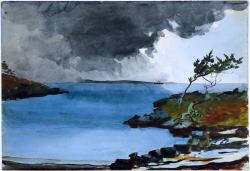 |
Home ~ Emphasis added below |
|
"He who has ears to hear, let him hear!"
(Luke 14:35) |
|
(Note: I am writing this before the election. Afterward, I will be either too elated or too depressed to write coherently about anything.)
After spending five days without heat and without electricity, and seeing so many of my neighbors so much worse off than that, I find that Hurricane Sandy teaches us important lessons. These are lessons that apply no matter who’s in the White House.
First lesson: Government by its very nature is too big, too slow, too cumbersome, too far removed from the scene of the action, too easily distracted by politics, and too wasteful ever to be able to react swiftly and efficiently to emergencies. During a crisis and its aftermath, bad things happen fast. People wind up shivering in the dark because some clerk in Washington didn’t submit the right paperwork for fuel and blankets.
Let’s indulge in high fantasy and assume no corruption, no spite or pettiness, no out-and-out incompetence—a government of angels. Even then there are still so many chutes and ladders between Washington and Staten Island, it’s simply impossible not to get hung up on one or more of them. Even New York’s state government in Albany is too big, too slow, too far away.
If needful things don’t get done locally, it’s likely that they won’t get done at all. They preach and preach at us to be dependent on the government, but when we really need it, the government always lets us down.
Second lesson: Bad news for Agenda 21 fans—when high-density occupancy fails, it fails big. Herding people together like cattle makes them more vulnerable to natural disasters. You don’t want to be on the 20th floor of a high-rise when the power conks out. Massing all the people into one small area only makes them a target. Take the same people and spread them out in a suburb, and there will always be some who escape the worst of it.
Third lesson: If you live along the coast, you can be sure that sometime during your life, you’re going to get walloped by a coastal storm. Ask anyone who’s lived on Long Beach Island, NJ, for the last 50 or 60 years. They’ve all been through it more than once—homes washed out to sea, people swept away, communications severed, the works. In the 1962 storm, a U.S. Navy destroyer was tossed up on the beach like a toy, and the town’s police chief perished on a flooded road.
It’s not possible to protect the coastal population from coastal storms. Sooner or later they’re going to get it. It goes with the territory. So might it not be wise to have, within easy reach of those shore communities, warehouses stocked with generators, gasoline, food, blankets, bottled water, etc.?
Fourth lesson: Under no circumstances will big-government utopians and Global Warming zealots ever change their minds. Got a hurricane? It must be Global Warming! Got a blizzard? Ditto!
For them any excuse at all is an excuse to grow the government. Like other simple organisms, they respond the same way to every stimulus. Too hot? Twitch. Too cold? Twitch. Raise taxes. Create a new bureaucracy. Hire thousands more government employees, to be pensioned off at 55 and paid handsomely for the rest of their lives for not working.Draw up a few thousand more new rules and regulations further restricting what we can do, and adding to the list of things we must do. Whether it’s a hurricane, a blizzard, an earthquake, a tsunami, a volcano, or an invasion from Mars, it must be caused by Global Warming and only a bigger, costlier, more powerful government can save us—any excuse to hop on a private jet to Davos, Switzerland, and there sip champagne while pontificating on the need to deprive the poor plebs of their air conditioning. We’ve seen it all before.
Fifth lesson: In a time of crisis, what most politicians are good at is getting their picture taken, and precious little else. It’s hard to forget Mayor Giuliani and his police and fire commissioners actually on the scene on September 11, at no small risk to their own lives, trying to get things done. But the reality seldom lives up to that idea. The usual pattern—be it a president, governor, senator, or grand poobah—is, “He came, he saw, he got his picture taken, and he left.” Sometimes they offer what they think is good advice, as when Mayor Michael Bloomberg, during a rather nasty blizzard two or three years ago, counseled frustrated New Yorkers to go see a Broadway play. Sometimes even your local government is all but useless.
Sandy will not be the first hurricane to blast our shores. These are acts of God that no man can control, no matter how high they raise your taxes.
But if we could wean ourselves off FEMA and the rest of the government’s unkept and unkeepable promises, we just might, maybe, find some ways to be better prepared, locally, for the next disaster.
© 2012 Lee Duigon - All Rights Reserved
|
Visit Lee Duigon's website here: LeeDuigon.com
Read the whole article here
Notes:
1. Weather modification, Wikipedia at http://en.wikipedia.org/wiki/Weather_modification
2. Adan Salazar, "Could Hurricane Sandy be Weather Modification at Work?" http://www.infowars.com/could-hurricane-sandy-be-weather-modification-at-work/